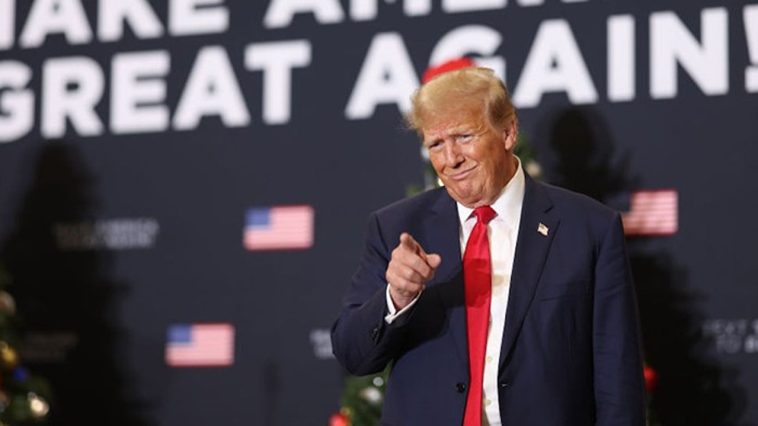LISTEN HERE:
A growing belief among legal scholars is that the final word on the possible removal of former President, Donald Trump, from various states’ ballots, due to alleged participation in the events of January 6, 2021, could wind up landing on the steps of the U.S. Supreme Court.
While the ex-president has yet to face formal charges or convictions that would legitimately label him a participant in an ‘insurrection’, a related proviso under the 14th Amendment has led to his removal from ballots in both Colorado and Maine.
The 14th Amendment, a historical piece of legislation birthed just after the Civil War, has created a conundrum that some states have chosen to act upon, while others have resisted. Interestingly, Michigan and Minnesota have denied attempts to delist Trump from their ballots. Likewise, California’s secretary of state ruled against such an action last week, according to Newsmax.
As the mix of state decisions creates an unpredictable quilt of legal standing for the former president, The New York Times reports that Trump’s attorneys are readying themselves to challenge Colorado and Maine’s seemingly unilateral decisions. These actions could potentially result in the Supreme Court stepping in to resolve the issue definitively.
The debate about the Court’s intervention isn’t unanimous among the legal community though. A key difference pointed out by Doug Spencer, a law professor at the University of Colorado, differentiates between the reaction of the Supreme Court when it comes to disagreements among federal circuits versus state Supreme Courts.
Spencer told the Washington Examiner how the intervention likelihood increased after Colorado’s decision, yet the divide among state Supreme Courts usually doesn’t prompt the nation’s highest court’s interference, especially when state law serves as the deciding ground.
Despite the varied opinions, other legal experts argue the matter will inevitably loop back to the Supreme Court. Albany Law School Professor Ray Brescia voiced his belief to the Examiner that it ultimately falls on the Supreme Court to decide. Brescia based his argument on the ‘different procedural postures’ states have adopted in response to attempts at removing Trump from their ballots.
Various groups, including organizations leaning left and voters fundamentally opposed to Trump have coalesced to file legal actions across 30 states with the goal of removing the former president from their ballots. However, Trump has scored victories in over half of these cases, as reported by The Guardian. Currently, legal suits persist only in 14 states: Alaska, Arizona, Nevada, New Jersey, New Mexico, New York, Oregon, South Carolina, Texas, Vermont, Virginia, West Virginia, Wisconsin, and Wyoming.
The likely eventuality that the U.S. Supreme Court will have to intervene is further highlighted by the disparate legal views on whether a formal conviction of ‘insurrection’ is a prerequisite for deeming someone constitutionally ineligible due to engagement in one. Brescia explained that those contesting Trump’s place on the ballot face a higher burden than those advocating for his inclusion.
Sharing his perspective, Brescia made it clear that those who wish to keep the ex-president off the ballot have a bigger hill to climb, drawing an analogy with an elaborate billiards shot, a ‘triple bank shot,’ where one attempts to manoeuvre the cue ball onto another table.
This sentiment—that it’s up to the Supreme Court to settle the controversy—is largely shared by other legal experts, notably including Ellie Honig, a legal analyst for CNN and former assistant U.S. Attorney. During a recent segment discussing the fallout from Maine Secretary of State Shenna Bellows’ decision to remove Trump from the ballot, the point was raised about interpreting the 14th Amendment’s relevance to the situation.
CNN anchor John Berman aired questions surrounding the 14th Amendment Section 3—in plain text, stating that those engaged in insurrection are ineligible for office—implying that if Bellows deems Trump to have participated in insurrection, his place on the Maine primary ballot is threatened. But is it really that straightforward?
Honig’s response? Not quite. He detailed that while identifying participation in insurrection as impeachment-worthy is straightforward by the 14th Amendment, the complex bit is determining the specifics of deciding it and the subsequent process.
So, the path forward remains a labyrinthine map of legal opinions, state actions, and constitutional scrutiny. However, the consensus appears to be leaning towards a final arbitration by the U.S. Supreme Court, as states appear to be writing their own versions of the narrative with varied legal interpretations of the 14th Amendment and the notion of insurrection.
At its core, the matter pivots on the balance between states’ rights and constitutional consistency, affording a full view of the fascinating and complex machine that is the U.S. legal and political system. It’s a pivotal moment—not only in the story of the former president’s political future but also in the enduring narrative of our American democratic process.



